|
|
|
Sort Order |
|
|
|
Items / Page
|
|
|
|
|
|
|
| Srl | Item |
| 1 |
ID:
119129
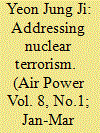

|
|
|
| 2 |
ID:
067863
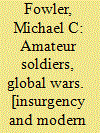

|
|
|
|
|
| Publication |
Westport, Praeger Security International, 2005.
|
| Description |
xiii, 183p.
|
| Standard Number |
0275981363
|
|
|
|
|
|
|
|
|
|
|
|
Copies: C:1/I:0,R:0,Q:0
Circulation
| Accession# | Call# | Current Location | Status | Policy | Location |
| 050811 | 355.0218/FOW 050811 | Main | On Shelf | General | |
|
|
|
|
| 3 |
ID:
064694


|
|
|
|
|
| Publication |
Santa Monica, Rand Corporation, 2005.
|
| Description |
xix, 84p.
|
| Standard Number |
0833037676
|
|
|
|
|
|
|
|
|
|
|
|
Copies: C:2/I:0,R:0,Q:0
Circulation
| Accession# | Call# | Current Location | Status | Policy | Location |
| 049899 | 303.625/JAC 049899 | Main | On Shelf | General | |
| 049900 | 303.625/JAC 049900 | Main | On Shelf | General | |
|
|
|
|
| 4 |
ID:
122621
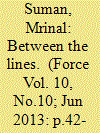

|
|
|
| 5 |
ID:
092999
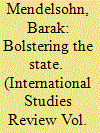

|
|
|
|
|
| Publication |
2009.
|
| Summary/Abstract |
Looking beyond the military component of the global war on terrorism this article identifies a multilateral and multidimensional effort to revamp the state-based order. This effort is guided by four principles: (i) states are the primary actors in the confrontation with the jihadi movement, and state sovereignty must be respected in the various cooperative counterterrorism efforts; (ii) as members in the international society, states hold obligations to the collective not to allow terrorists to use their territories to harm other states; (iii) because numerous states are weak, a special effort must be made to bolster states' capacities so that they will be able to realize their obligations to the society of states; and (iv) the enormous demands of capacity building necessitate particular emphasis on interstate cooperation, including the provision of assistance for weak states and sharing of best practices. The article then presents two spheres of action in the war on terrorism, indicative of this general design: the regime to suppress the financing of terrorism and states' efforts to reinforce control over their borders. It concludes by arguing that the implications of the efforts to reinforce the state-based order require that we pay it much closer attention.
|
|
|
|
|
|
|
|
|
|
|
|
|
|
|
|
| 6 |
ID:
074620
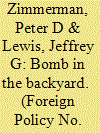

|
|
|
| 7 |
ID:
084693


|
|
|
| 8 |
ID:
067183
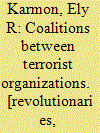

|
|
|
|
|
| Publication |
Leiden, Martinus Nijhoff Publishers, 2005.
|
| Description |
xiii, 425p.
|
| Standard Number |
9004143580
|
|
|
|
|
|
|
|
|
|
|
|
Copies: C:1/I:0,R:0,Q:0
Circulation
| Accession# | Call# | Current Location | Status | Policy | Location |
| 050500 | 303.625/KAR 050500 | Main | On Shelf | General | |
|
|
|
|
| 9 |
ID:
102520
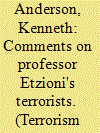

|
|
|
| 10 |
ID:
089740
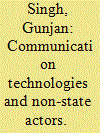

|
|
|
|
|
| Publication |
2009.
|
| Summary/Abstract |
The revolution in communication technology could be said to have happened with the advent of the Internet and Mobile phones. Over the last three to four decades the mobile telephone technology has shown exponential growth. Today, this mode of communication has been used almost in every facet of life. It has significant amount of utility for the armed forces too. Moreover, this technology has become very handy for various non-state actors. In the recent past there are varous incidents where few terrorist groups have used this technology to their advantage. This article attempts to analyze how terrorists groups are cleverly using modern means of communication to their advantage with major emphasis on mobile phones.
|
|
|
|
|
|
|
|
|
|
|
|
|
|
|
|
| 11 |
ID:
128790
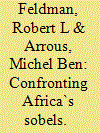

|
|
|
|
|
| Publication |
2013-14.
|
| Summary/Abstract |
While the phenomenon described in this article may appear to be an African problem, the Western world`s increasing involvement in fighting terrorists make it one that America`s military forces might encounter. Unfortunately, it could add a significant layer of complexity to US operation as American troops attempt to differentiate allies from enemies. In Africa, sometimes they are one and the same.
|
|
|
|
|
|
|
|
|
|
|
|
|
|
|
|
| 12 |
ID:
129883
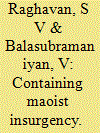

|
|
|
| 13 |
ID:
079848
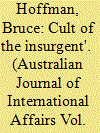

|
|
|
|
|
| Publication |
2007.
|
| Summary/Abstract |
More important than the potential geographical spread of a specific weapon, tactic or expertise is the emulation or inspiration of the 'culture' surrounding a terrorist or insurgent movement. This article argues that a 'cult of the insurgent' has arisen as a result of the aura of success surrounding both the Iraqi insurgents in their ongoing confrontation with the United States military and Hezbollah in its confrontation in the northern summer of 2006 with Israel. Further, this 'cult of the insurgent' will prove the most critical factor in inspiring, motivating and animating the spread of lethal and destructive expertise among other terrorist and insurgent groups worldwide. In the future, therefore, our adversaries will likely conclude that the best and most cost-effective means to confront either a superpower or the superior, conventional military forces of an established nation-state is through a campaign reliant on terrorist and insurgent tactics involving stand-off attacks utilising IEDS (improvised explosive devices) and portable missiles and mortars1
|
|
|
|
|
|
|
|
|
|
|
|
|
|
|
|
| 14 |
ID:
026739
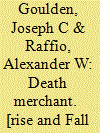

|
|
|
|
|
| Publication |
London, Sidgwick & Jackson, 1984.
|
| Description |
455p.
|
| Standard Number |
0283992131
|
|
|
|
|
|
|
|
|
|
|
|
Copies: C:1/I:0,R:0,Q:0
Circulation
| Accession# | Call# | Current Location | Status | Policy | Location |
| 032414 | 355.3432092/GOU 032414 | Main | On Shelf | General | |
|
|
|
|
| 15 |
ID:
072121
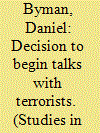

|
|
|
|
|
| Publication |
2006.
|
| Summary/Abstract |
Governments have many means to begin a dialogue with terrorist groups. The offer of talks may lead terrorists' constituents to reduce their support for violence, and moderates within a group itself may also turn away from violence. Despite these potential benefits, even the consideration of entering discussions carries many risks. Talks with U.S. officials do indeed reward the use of terrorism, tangibly demonstrating that groups can kill innocents and yet become legitimate interlocutors-a reward that is costly both in terms of reducing the prevalence of this tactic worldwide and because it inevitably angers local allies fighting the groups. Moreover, talks often fail in a variety of ways, giving the terrorists a breathing space to rearm and organize and leaving the government looking foolish. Because talks often fail, policymakers should carefully explore whether the conditions are right for any hope of success before they begin a dialogue.
|
|
|
|
|
|
|
|
|
|
|
|
|
|
|
|
| 16 |
ID:
123198


|
|
|
|
|
| Publication |
2013.
|
| Summary/Abstract |
THE GROWING instability in Egypt's Sinai Peninsula represents one of the most dangerous, and most anticipated, crises in the Middle East. Even before the 2011 Egyptian revolution, the security vacuum in the Sinai allowed criminals and terrorists, including those with an ideology akin to Al Qaeda's, to expand their operations. In the chaos after the revolution, these problems have worsened. Meanwhile, various Palestinian groups use the Sinai as a launching pad for attacks against Israel.
|
|
|
|
|
|
|
|
|
|
|
|
|
|
|
|
| 17 |
ID:
094511


|
|
|
| 18 |
ID:
140349
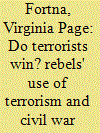

|
|
|
|
|
| Summary/Abstract |
How effective is terrorism? This question has generated lively scholarly debate and is of obvious importance to policy-makers. However, most existing studies of terrorism are not well equipped to answer this question because they lack an appropriate comparison. This article compares the outcomes of civil wars to assess whether rebel groups that use terrorism fare better than those who eschew this tactic. I evaluate the advantages and disadvantages of terrorism relative to other tactics used in civil war. Because terrorism is not a tactic employed at random, I first briefly explore empirically which groups use terrorism. Controlling for factors that may affect both the use of terrorism and war outcomes, I find that although civil wars involving terrorism last longer than other wars, terrorist rebel groups are generally less likely to achieve their larger political objectives than are nonterrorist groups. Terrorism may be less ineffective against democracies, but even in this context, terrorists do not win.
|
|
|
|
|
|
|
|
|
|
|
|
|
|
|
|
| 19 |
ID:
052568
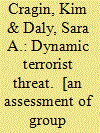

|
|
|
|
|
| Publication |
Santa Monica, Rand Corporation, 2004.
|
| Description |
xx, 106p.
|
| Standard Number |
0833034944
|
|
|
|
|
|
|
|
|
|
|
|
Copies: C:1/I:0,R:1,Q:0
Circulation
| Accession# | Call# | Current Location | Status | Policy | Location |
| 048296 | 303.625/CRA 048296 | Main | On Shelf | Reference books | |
|
|
|
|
| 20 |
ID:
126320
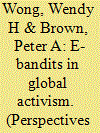

|
|
|
|
|
| Publication |
2013.
|
| Summary/Abstract |
In recent years, WikiLeaks and Anonymous have made headlines distributing confidential information, defacing websites, and generating protest around political issues. Although many have dismissed these actors as terrorists, criminals, and troublemakers, we argue that such actors are emblematic of a new kind of political actor: extraordinary bandits (e-bandits) that engage in the politics of no one via anonymizing Internet technologies. Building on Hobsbawm's idea of the social bandit, we show how these actors fundamentally change the terms of global activism. First, as political actors, e-bandits are akin to Robin Hood, resisting the powers that be who threaten the desire to keep the Internet free, not through lobbying legislators, but by "taking" what has been deemed off limits. Second, e-banditry forces us to think about how technology changes "ordinary" transnational activism. Iconic images of street protests and massive marches often underlie the way we as scholars think about social movements and citizen action; they are ordinary ways we expect non-state actors to behave when they demand political change. E-bandits force us to understand political protest as virtual missives and actions, activity that leaves no physical traces but that has real-world consequences, as when home phone numbers and addresses of public officials are released. Finally, e-banditry is relatively open in terms of who participates, which contributes to the growing sense that activism has outgrown organizations as the way by which individuals connect. We illustrate our theory with the actions of two e-bandits, Anonymous and WikiLeaks.
|
|
|
|
|
|
|
|
|
|
|
|
|
|
|
|
|
|
|
|
|